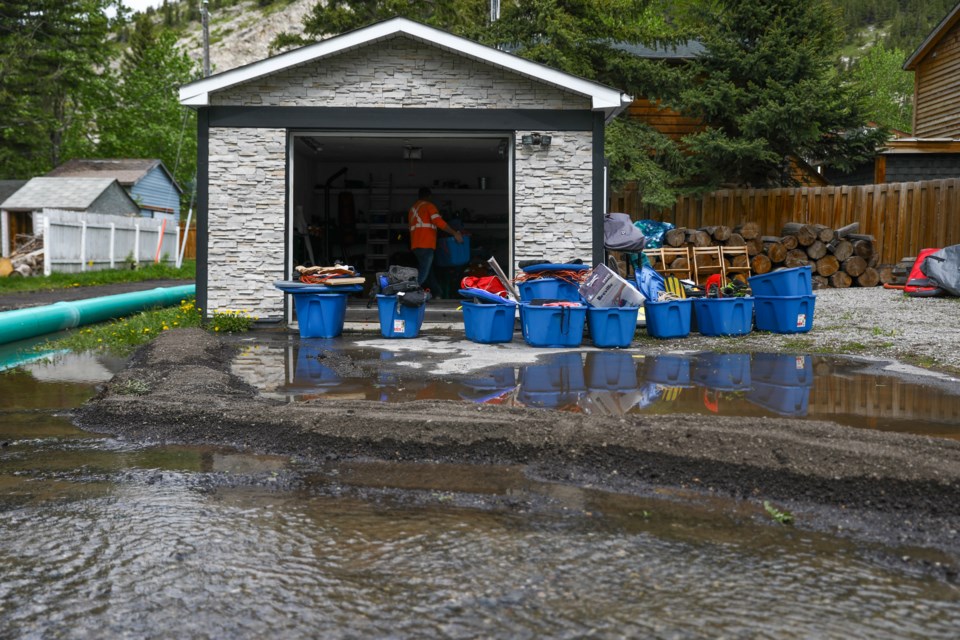EXSHAW – Homeowners in east Exshaw who had to deal with higher than usual groundwater levels last spring, but were denied provincial disaster recovery program support, will see some tax relief from the MD of Bighorn.
Councillor Paul Ryan put forward a motion in December to offer a 50 per cent reduction to 2020 municipal taxes for any property owners in the MD of Bighorn that suffered a financial loss due to groundwater flooding.
"As council is very aware, many residents encountered groundwater flooding in 2020 to one degree or another," Ryan said. "The impact was measured in manpower needed, or actual financial losses. I believe that it would be fair and equitable to grant any residents of the MD of Bighorn 50 per cent tax relief if they can prove that they suffered a financial loss.
"The cause of the groundwater flooding has not been definitely determined; however, I believe the cost to the MD in this would be minimal and demonstrates that municipalities can not only govern, but they can also be compassionate."
Director of finance Shaina Tutt told council that administration's recommendation was to decline the requests for municipal tax relief. Tutt said a hydrogeologist report prepared by McElhanney and publicly released in November pointed to the melting of higher than average snowpacks last winter as the primary cause of the flooding.
"I would also like to note that back in 2013, the post-flood decisions of council did provide tax relief by cancelling the municipal portion of taxes for each month a resident was out of their home," she said. "This situation is different in that no residents were out of their homes at the time they were inundated with flooding."
- RELATED: Engineering report can't rule out Exshaw Creek flood mitigation link to groundwater flooding
Nine properties applied to council in July for tax relief due to the groundwater flooding. The request was referred to the MD's finance and economic development committee and further postponed until the hydrogeological report was completed.
Coun. Erik Butters said by opening the motion up to any homeowner in the entire MD of Bighorn who may have been affected, there was no indication for council of what that would cost and "opens a real can of worms."
"This is a pretty open-ended thing," Butters said. "Perhaps no other residents in Bighorn experienced groundwater flooding in 2020, or maybe a lot of them did. This approach to this problem gives us no indication of what the ultimate cost might be."
Coun. Lisa Rosvold put forward a successful amendment to only apply to properties at the eastern edge of Exshaw – along Pigeon Mountain Drive and Mount McGillivray Drive.
Ryan's motion also made it contingent upon property owners demonstrating there was a financial loss and provided 90 days for them to do so.
Coun. Paul Clark and Chief Administrative Officer Robert Ellis had concerns with how administration would prove a financial loss.
"Some of these homes may have been covered by insurance, some may not, some may add many things into what they think they may have lost," Ellis said. "I do not know how to gauge what is financial loss."
Ellis said it would be up to administration to say what is and is not a financial loss.
"I am a little uncertain about that," he said, adding it is administration's position that council took a measured and equitable approach to municipal taxes for the 2013 flood and during the 2020 pandemic in terms of the rates that were set and the deadline for payment.
Clark said he is sympathetic to those who suffered financially, or who cannot use their basement, but questioned what would qualify as a financial loss.
"A loss has to be demonstrated and that was why I was very clear to use the word prove, not claim," Ryan said.
Rosvold asked administration to provide an average amount that would be considered as part of this decision. However, Tutt said she did not have an average prepared and that it would be based on the assessment of each property affected.
"When I originally brought this forward, it was based on the number of letters the MD had received," Ryan said. "A rough calculation, I believe I argued at the time, was that the amount was somewhere around $10,000 that it would cost the MD if we were to forgive 50 per cent of municipal portion of taxes."
Rosvold also took issue with the fact that administration seems to have reached a definitive conclusion about the cause of the groundwater flooding, even though the McElhanney report could not rule out that mitigation constructed in Exshaw Creek prior to the freshet had an affect on the flooding experienced by residents.
"That is a very definitive answer and I do not think it follows the same path or same conclusions the assessment necessarily identified to us," Rosvold said. "I do not see that as justification to decline the request for tax relief."
Rosvold expressed concern for the residents of east Exshaw and the lack of recommendations for solutions to this issue.
Reeve Dene Cooper said he did not support the motion and that he does not consider it equitable. He was the only council member to vote against the amended motion.
"I do not think benevolence is the only definition of equitable," Cooper said. "I think that this is not aligned with our common practice. If these people are in hardship, they should have been better directed to have their penalties dealt with over the next few years by entering into an agreement with our financial officers."







